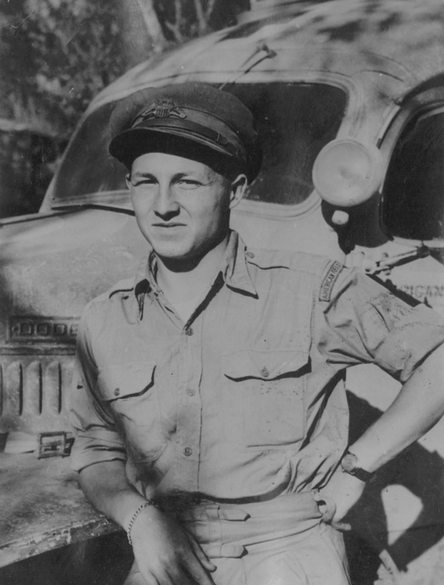Local Letters Provide Lessons in Contributions and Sacrifice
By Jennie Shurtleff
The Woodstock History Center has a new exhibit entitled Contributions and Sacrifice that will be opening on Wednesday, July 7. This exhibit was originally scheduled to open in 2020 to commemorate the 75th anniversary of the end of World War II. Unfortunately, that opening had to be delayed due to COVID 19. Although the delay was a disappointment, perhaps the exhibit has even more meaning now than it would have a year ago, since we as a country have just come through a period in which we were asked to contribute and make sacrifices for the greater good.
While most of the contributions and sacrifices asked of Americans in 2020 were very different from those asked of citizens in the early 1940s, there is a common thread – the willingness to share and put others first.
During World War II, on the home front people were tasked with raising victory gardens, canning their own food, filling essential factory and agricultural jobs, and complying with strict rationing that curtailed the availability of food and consumer goods. In 2020, Americans were asked to wear masks, to limit their purchases of certain items (such as hand sanitizer), and to curtail their interactions with others, which in many cases meant working and studying remotely.
While some Americans during World War II went off to fight aggressive foreign powers in epic battles, seventy-five years later, the people on the “front lines” were medical professionals and other essential workers such as grocery store staff, firefighters, and police officers who reported to their jobs, despite the risk of exposure to the deadly COVID virus.
I’ve heard many people exclaim how happy they are to have what is ostensibly the worst of the pandemic behind us. One can only imagine the elation that was felt by those both on the battlefields and the home front at the close of a war that had consumed America’s attention and resources for three and a half years and by the end of the war had claimed the lives of over 400,000 Americans, including nine young men from the greater Woodstock area.
One of those young men was Clyde Robinson. On May 15, 1944, Clyde wrote a letter to the Taylor family of Bridgewater that was published in the Vermont Standard on June 29, 1944.
Clyde was one of five children in the Robinson family who, along with three brothers and a sister, enlisted in the Service during the War. What is interesting about Clyde’s letter is that it reveals the tremendous hardships that he bore with good humor, instead of with complaint.
His letter to the Taylor family reads:
Received your most welcome letter last night but had to wait until this morning to read it, because the only light is that provided by nature. And besides that blackout regulations are to be taken into consideration.
You told me if I ever get any time off not to raise too much hell. If I have my say about it, when I do get that time off in the unseen future, all I want is a bed. After using the ground for months, I have only a faint idea what it is to be able to take off your clothes and get in between sheets. At times we do get a chance to take off our shoes and that is one of the things that head the luxury list. Can you imagine anybody crawling in bed back home with shoes and all on? Here I can’t imagine anybody crawling in with them off. One good thing about sleeping on good old mother earth is that you find out that you have joints, muscles and otherwise that you didn’t know that you had before. Do they ache!
I hear from the ones in England once in a while, and really look forward to “Brig’s” letters because he really gives me some pretty good accounts of what he is doing. (There are two brothers and a sister, Hilda, in England.)
Had my first hen and fresh eggs about three weeks ago. The hen was just about enough so you would want more, so gave it to one of my buddies. But the eggs were another one of those things you can put on the luxury list.
Clyde Robinson in uniform.
Since I have been on the beachhead I have saved over $200. I came here with 50 cents and as yet haven’t found a place to spend it. If this thing lasts long enough I will be rich, but haven’t least bit of an urge to become one of those kind.
Received a good conduct medal a few days ago after nearly four years.
“Sunny Italy” is really living up to its name at present and I have acquired quite a tan, even though half of it is dirt. Every time I get a chance to take a shower I come out 20 shades lighter than when I came in. Which reminds me, I have had two showers since I last wrote, so you can see I am getting in with the four hundred class now and am living in luxury.
Things are about the same as they were when I came here and I still have my chance to dodge “Kedesky” butterfly bombs and enemy artillery shells. So far I have done a pretty good job, even though I have had some of them singing my serial number, besides the ones that are tagged with “to whom they may concern.”
I will admit that at times things are pretty tough. But after those times are over we get together like a bunch of sad sacks and laugh at some of the crazy things we or someone else did. Those are the things I want to remember after it is all over...
Well, I guess I had better sign off because I have been up the biggest share of the night so my eyes are getting pretty heavy.
Thanks again for the swell letter and remember me to all.
Love to all.
CLYDE ROBINSON
P.S. Am still keeping my head down but my chin is up.
Photos of Cyde Robinson and the cemetery were he was ultimately laid to rest.
Similarly, Franklin Billings, better known as “Bill,” was another local boy who exhibited the same desire to serve and willingness to endure privation without complaint.
The United States entered the War while Bill was a student at Harvard College. Bill accelerated his studies so that he could graduate in 1943, instead of 1944. Upon graduation, he tried to enlist both in Oklahoma and in Woodstock; however, after discovering that he had a heart murmur, he was considered ineligible. He started working at General Electric, but simultaneously continued to search for a more direct way to serve, including attempting to enlist in the American Field Service. Since General Electric was considered a wartime-related business, Bill needed to get his supervisor’s approval to leave. At first, his supervisor was unwilling to let him go because he was one of the best employees; however, through a bit of clever negotiating, Bill was able to get his supervisor to facilitate his release from the company.
Once enlisted, Bill was stationed in Italy and worked as an ambulance driver. Driving an ambulance across mine-ridden fields was not a job for the faint-of-heart. In fact, Bill had started packing sand bags in the vehicles that he drove so that if he accidentally went over a mine that exploded, the sand could deaden the impact.
Bill Billings as an ambulance driver. In this photo, he is wearing the watch that survived the explosion. Image courtesy of the Billings family.
Bill Billings in uniform in front of his family’s home on Bond Street.
On May 30, 1944, Bill was driving an ambulance which he had fortunately packed with sand bags because on that fateful day his vehicle went over a hidden mine. Of the four people in the ambulance, one was uninjured, two ultimately died of their wounds, and Bill was severely injured. He survived only by crawling out through the windshield of the vehicle. His clothes were completely burned from his body, leaving him with only his boots and his watch.
A long convalescence awaited him that included skin grafts and reconstruction of his arm. Still, in a letter home to his mother, Bill – like Clyde – shared the hardship of the experience without complaint. He attempted to allay his mother’s fears by reassuring her that despite the catastrophic injuries that he had received, he was going to be fine. For instance, he noted that although his left arm was “rather paralyzed,” that he thought in a month or two, after the skin graft, it would be O.K. He also stated, “I have certainly had good care, what with sulfa drugs, penicillin (that new expensive drug), and blood plasma. The Americans certainly have the best medical equipment in the world… It will all turn out all right since eventually I will be as good as ever again, so don’t worry.”
It is humbling to read the letters of these two local men who willing put their lives on the line, and even when enduring incredible privation and injury, did so without complaint or bitterness.
While letters like these can teach us the facts of history… dates, places, historical events… perhaps even more importantly, they set a standard for us to emulate – one of contribution and sacrifice.




